
By Brett Larson, August 27, 2015
At a public meeting at McGregor High School on Aug. 25, opinions were more than 2-to-1 against an oil pipeline that would cross the Rice Lake and Sandy Lake watersheds. Of the 29 individuals who spoke, 21 were opposed to the project and eight in favor.
The Line 3 pipeline would be the second in a corridor proposed for Enbridge Energy’s Sandpiper pipeline. Line 3 would replace an outdated pipeline that crosses the state to bring tar sands oil from Canada, to Superior, Wisc.
The Mille Lacs Band is strongly opposing both pipelines because they would cross wild rice habitat important to the Band’s District II Minisinaakwaang community and risk the health and safety of Band members.
The Minnesota Public Utilities Commission (PUC) and Energy Environmental Review and Analysis (EERA) unit of the Department of Commerce conducted the public information and environmental review scoping meeting.
They will hold another meeting Aug. 27 at the East Lake Community Center south of McGregor.
Band member Tania Aubid spoke after Ross Wagner, the Economic Development Coordinator for Aitkin County. Wagner voiced support for the project, in part because Aitkin County needs the tax revenue.
Aubid responded, “Yes we are a poor county, and no, we do not need Enbridge’s money to pull us out. … I think we are rich here, with the manoomin, the berries, the water. … One day we’re going to find a cure for cancer, but before that time we’re going to find a cure for this Enbridge cancer.”
Sandy Lake Band member Sandra Skinaway highlighted the dangers of pipelines and said the idea of a pipeline through her family’s homeland is “completely absurd and downright crazy.” She quoted the United Nations Declaration of Rights of Indigenous Peoples, Article 29: “Indigenous peoples have the right to the conservation and protection of the environment and the productive capacity of their lands or territories and resources.”
Skinaway said, “Aitkin County commissioners and district legislators have already placed their rubber stamps on this pipeline, and I am here to say they do not speak for us.”
White Earth Band members Everlasting Wind and Winona LaDuke also spoke. LaDuke arrived in a horse-drawn carriage as part of the “Love Water Not Oil” tour sponsored by her organization, Honor the Earth. The group is riding horses and paddling canoes throughout the region to raise awareness of the pipeline issue.
LaDuke, who was the last to speak, questioned Jamie MacAlister, the Environmental Review Manager for the Department of Commerce. LaDuke wanted to know why the meetings were only held along the one corridor, even though the route had not yet been approved.
MacAlister replied that the process calls for meetings only in the “preferred” corridor of the applicant, in this case Enbridge.
LaDuke also asked why the Public Utilities Commission and Department of Commerce have still not engaged in formal consultation with tribes, in spite of an order from Gov. Mark Dayton that they should do so.
MacAlister said it is not her role and was unable to answer the question.
Most of those who were in favor of the pipeline were members of plumbing and pipefitting unions. Also in favor was Rep. Dale Lueck, who represents Aitkin and most of Crow Wing counties in the Minnesota House of Representatives. Lueck accused those who oppose the pipeline of claiming that “My back yard is more precious than yours,” which he said is “a disastrous road for a community and the state of Minnesota to go down.” He said “Christian ethics” discourage that sort of thinking.
Several people responded to Lueck throughout the course of the day, saying the pipeline should not be in anyone’s back yard, or arguing that some back yards are different than others because they are protected by treaties.
Some of the supporters of the pipeline argued that pipelines are safer than trains, which are currently transporting oil through Minnesota. Pipeline opponents called that a “false choice,” pointing out that the oil industry had not made any commitments to reduce the number of trains or trucks used to transport oil if the pipeline is approved.
Among those who spoke against the pipeline were a minister, the chair of the Aitkin County Lakes and Rivers Association, and the director of Minnesota 350, an environmental group fighting climate change. Some argued that the pipeline should be opposed because humanity is running out of time to combat climate change; others pointed out that oil from the tar sands of Alberta is dirty and dangerous; still others focused on the uniqueness of the region the pipeline would cross and the danger that a spill could destroy wild rice beds and disrupt indigenous communities like Minisinaakwaang.
Kathy LaBerge questioned Enbridge’s safety record, pointing out that a new pipeline in Alberta failed, causing the largest leak the province had ever seen. She said Enbridge was caught breaking safety rules in 117 out of 125 pump stations. “ I don’t want Minnesota to be a testing ground in their attempt to get it right for the very first time,” she concluded.
A second meeting on Tuesday evening drew a smaller crowd. District II Band member Harvey GoodSky Jr. and attorney Frank Bibeau of Honor the Earth spoke in opposition to the pipeline.
Project Summary from the Department of Commerce
The Minnesota portion of the Line 3 Replacement project will replace approximately 282 miles of the existing 34-inch diameter Line 3 pipeline with 337 miles of 36-inch diameter pipeline and associated facilities between the North Dakota/Minnesota border and the Minnesota/Wisconsin border. From the North Dakota/Minnesota border, the pipeline will follow the existing Enbridge mainline corridor to Clearbrook. East of Clearbrook, the project will follow the proposed Sandpiper pipeline.
The project will cross Kittson, Marshall, Pennington, Polk, Red Lake, Clearwater, Hubbard, Wadena, Cass, Crow Wing, Aitkin and Carlton counties in Minnesota. The existing Line 3 pipeline will be permanently deactivated in-place after the new pipeline is constructed, tested and placed into service. As proposed, the project will include eight pump stations, including valves, metering, monitoring equipment, and associated electrical facilities.
Four of the existing pump stations will be upgraded at Donaldson (Kittson County), Viking (Marshall County), Plummer (Red Lake County) and Clearbrook (Clearwater County). East of Clearbrook, four new pump stations will be constructed at Two Inlets (Hubbard County), Backus (Cass County), Palisade (Aitkin County) and Cromwell (Carlton County).
There is currently an open comment period for this project.
Comments will be accepted through September 30, 2015.
Contact the Public Advisor at consumer.puc@state.mn.us, 651-296-0406 or 1-800-657-3782 to sign up for the mailing list.
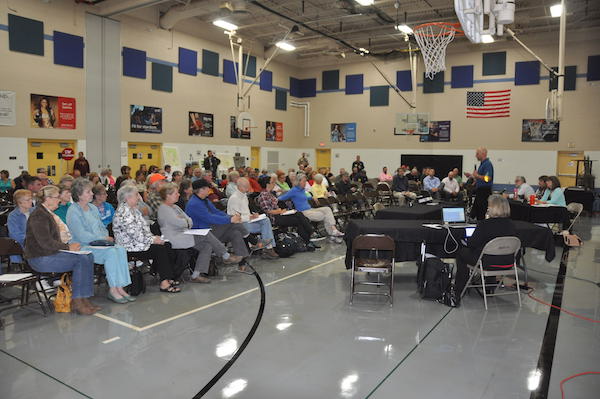
Nearly 200 people were present for the beginning of the meeting, but the crowd thinned as the day went on.
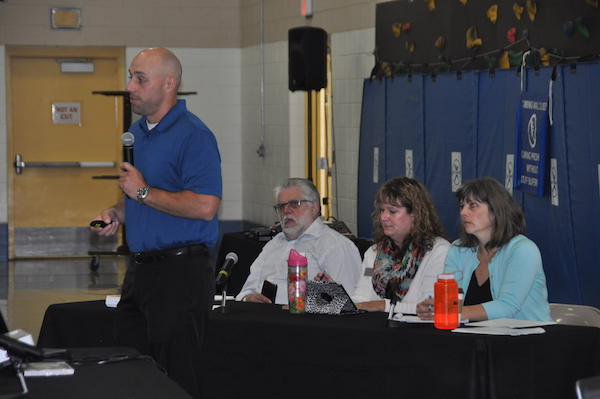
A representative of Enbridge Energy opened the meeting with a description of the proposed Line 3 replacement project.
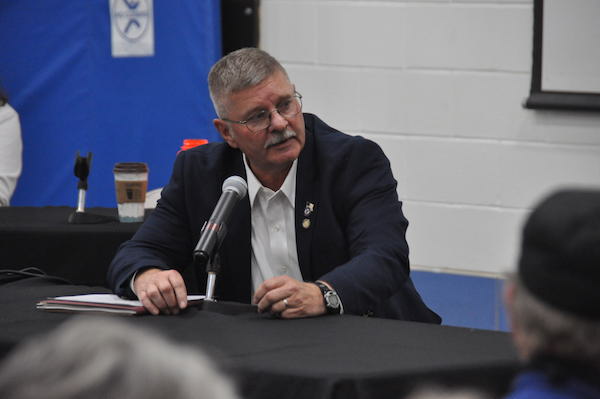
Rep. Dale Lueck spoke in favor of the project and accused opponents of favoring their own “back yard” over others’.
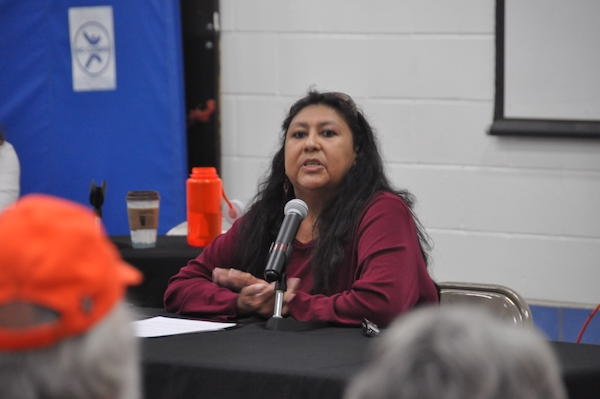
Sandra Skinaway of the Sandy Lake Band spoke passionately in opposition to the pipeline. “We have hunted, fished and gathered here for centuries,” she said.
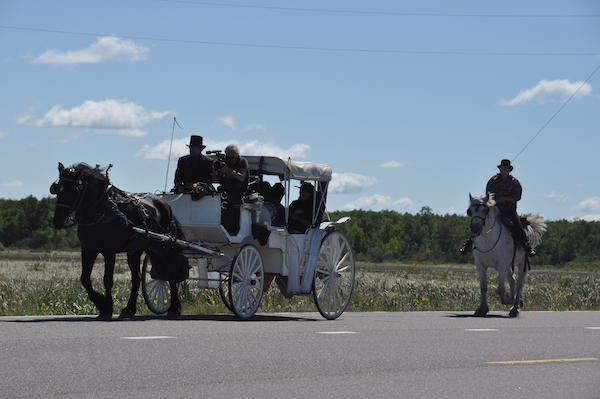
Participants in the “Love Water, Not Oil” tour arrived at McGregor High School via carriage and horseback. The tour continues throughout the week with horseback rides and canoe trips around the region.
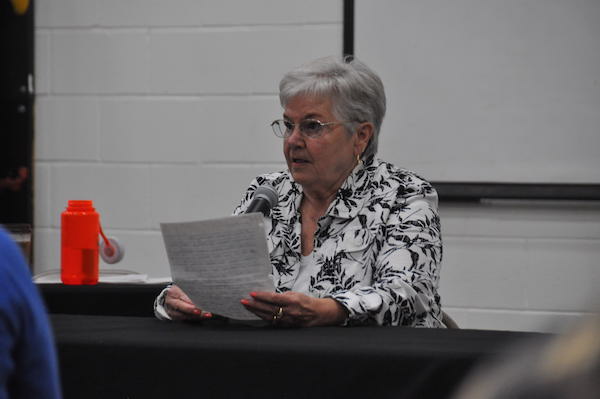
Kathy LaBerge questioned Enbridge Energy’s safety record.
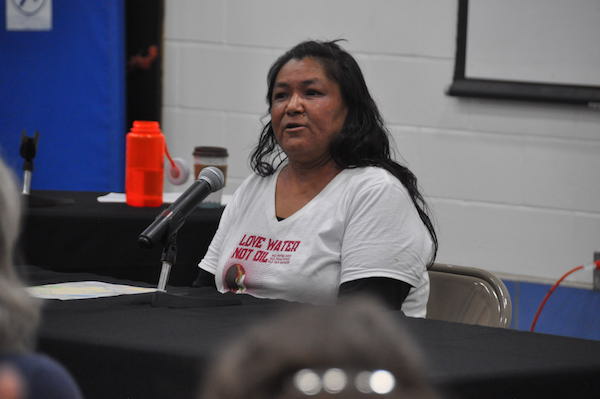
Tania Aubid said, “One day we’re going to find a cure for cancer, but before that time we’re going to find a cure for this Enbridge cancer.”
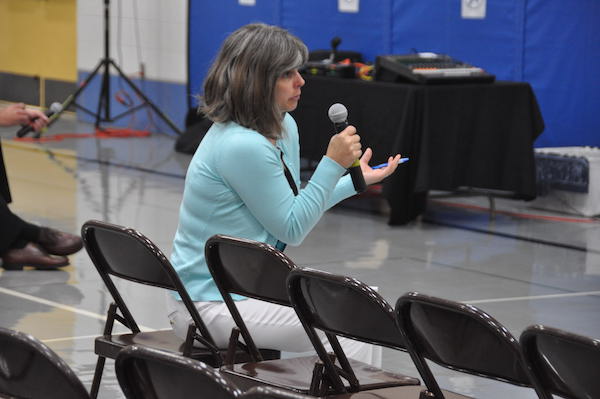
Jamie MacAlister of the Minnesota Department of Commerce responded to questions from Winona LaDuke.